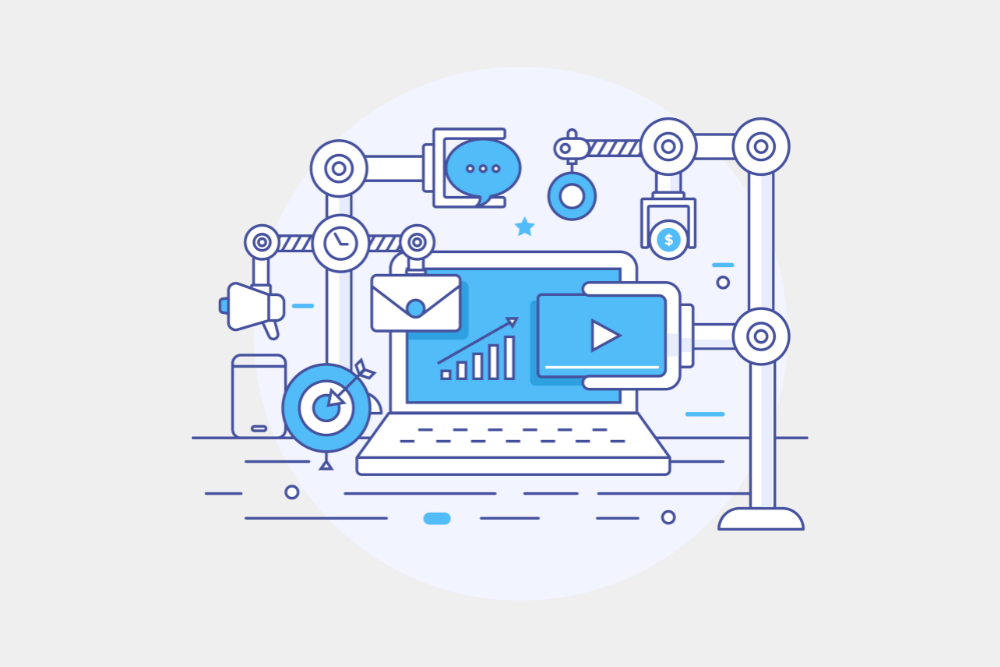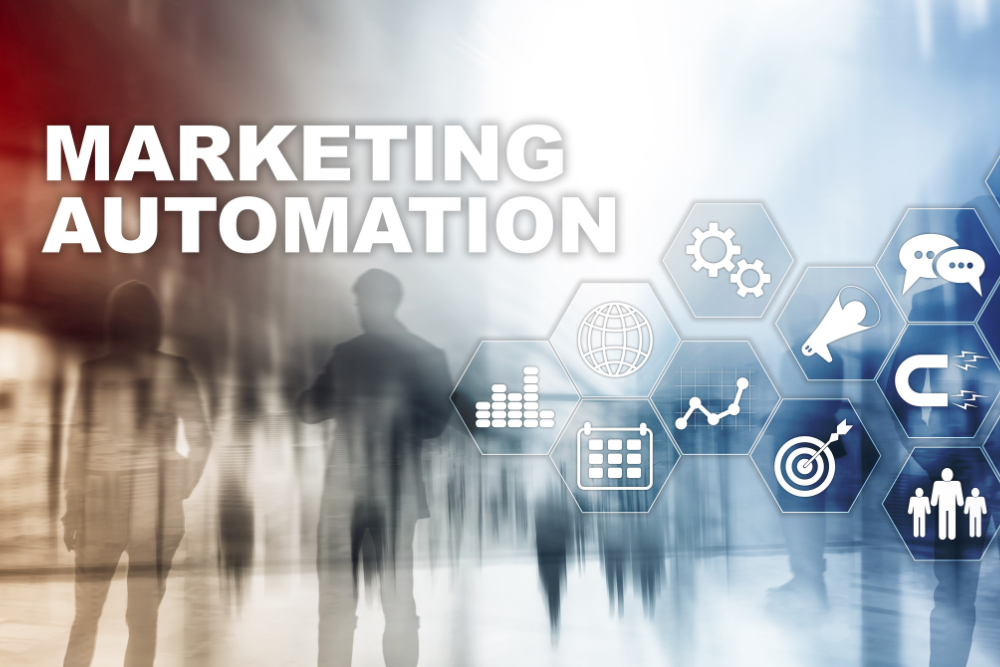Market automation is an innovative and invaluable tool to streamline digital marketing processes. It combines software, digital technologies, and artificial intelligence techniques to automate parts of routine marketing activities. As a result, market automation has transformed the field of marketing.
Automation enables marketers to build more efficient target marketing campaigns, analyse customer behaviours quickly and accurately, optimise resources precisely, focus on revenue growth strategies, and maintain a continuous improvement process. Market automation gives organisations the dynamic tools they need to maximise operational performance while providing powerful insights that can help shape future decisions within their marketing efforts.
What is Marketing Automation used for?
Marketing automation can be a powerful resource that streamlines tedious, repetitive tasks and increases efficiency. In addition, it helps marketers manage their biggest challenge: time constraints. Rather than doing everything manually, you are free to focus on more strategic goals such as developing campaigns, monitoring performance metrics (KPIs), implementing effective customer loyalty programs – the list goes on.
With automated solutions like lead generation/nurturing/scoring, segmentation and targeting of audiences, upselling and cross-selling activities, and analytics & reporting, achieving success in your marketing initiatives just got easier.
How does Market Automation work, and how can it be used to improve the efficiency of markets across the globe?
Market automation is quickly emerging as a powerful tool for improving efficiency in markets worldwide. Automation allows for quicker, more accurate information exchanges, enabling traders to respond faster to market events.
By modernising processes such as order processing, trade settlements, and risk management, automation can help traders better manage their investments and reduce operational costs. Automated solutions also change how companies present data and provide better analytics that enables quick decision-making.
Furthermore, automated systems reduce the manual labour associated with data collection and analysis, allowing resources to be reallocated to higher-value activities. As markets become increasingly connected globally, this automation technology is essential in ensuring efficient access to up-to-date information that can significantly impact real-time trading decisions.
Market automation is an invaluable tool for optimising marketing processes and driving efficiency in markets worldwide. Simplifying monotonous tasks and providing more excellent analytics help traders make more informed decisions that can result in improved profitability. Automation also allows marketers to focus on creating strategies and campaigns that enable them to reach their goals faster than ever before. Its various benefits are becoming a crucial tool for improving marketing performance.
Benefits of Marketing Automation
Harness the power of marketing automation to maximise your return on investment. It is a digital toolkit designed for businesses of all sizes and budgets, which helps streamline lead nurture campaigns and customer acquisition processes such as cross-selling and upsells. 63% report seeing positive ROI within six months – make sure you are one among them. Here are some key benefits market automation will bring:
Higher conversion rates
When it comes to marketing successfully, nothing is more valuable than having clean customer data that can help you accurately identify and reach your desired target audience. Leveraging the power of marketing automation helps make sure this happens on time, so offers made resonate with those likely to purchase – maximising sales potential.
Less time and resources are wasted on ineffective campaigns
With full access to opportunity and revenue data, marketers can kiss intuition-based planning goodbye. Now they have the power of cold hard facts that help inform decisions – like whether cutting a campaign is necessary because it is not providing a desired return on investment (ROI).
Keep everything in order
Marketing automation is the ultimate problem-solver. It simplifies transactions, arranges activities in manageable schedules, and unites teams to reach their objectives quickly.
Increased employee productivity
When marketing teams have automation tools, they free up time to focus on the strategic tasks that drive the business forward. In addition, these solutions optimise workflows so employees can be more efficient and productive while tackling challenging projects – making their jobs much more stimulating.
Drive and optimise revenue growth
With the right marketing automation software, scaling your business and increasing profits is easy. By linking silos between sales and marketing teams, you can optimise spending for maximum return with more incredible lead generation speed & accuracy. Equipping yourself with enriched customer data will also enable you to identify key accounts more quickly and measure each stage of the buying cycle so that campaigns are optimised for successful outcomes.
Improved customer retention levels
Acquiring customers is only the first step in successful marketing – maintaining those customer relationships is just as important. With marketing automation, you can create loyalty programs that invite repeat purchases, introduce relevant upsell and cross-sell opportunities to existing purchasers, and foster a strong bond between your brand and customers.
Marketing automation best practices
To ensure that your marketing automation efforts are successful, take time to align them with the desired strategic outcomes.
- Start by looking at quality over quantity – invest in tools and content that best serve customer needs while connecting those data points between buyer journeys.
- Additionally, tailor a personalised experience for users when they interact across channels; use automation workflows as an efficient way of doing so.
- Lastly, create engaging content that resonates with buyers’ interests – it may be worth investing more resources into one asset if you know it will provide highly impactful results.
Potential risks associated with market automation to consider before implementation
Automating parts or processes of the market creates new opportunities for innovation and cost-effectiveness, but risks should be contemplated before implementation.
- These risks include incomplete or inaccurate data input from manual entry.
- A higher risk of cyber-attacks due to increased digital integration.
- A lack of transparency in decision-making processes.
- Changes to customers’ experience due to the altered behaviour analytics.
- Additionally, automation often requires significant upfront and ongoing infrastructure investments that may not offer an immediate return on investment.
To mitigate these risks, organisations should ensure a comprehensive evaluation of all aspects of the business before moving forward with any automation.
How does marketing automation affect your customers?
As businesses and customers become more digitally connected, information overload is one challenge. Your customers are constantly overwhelmed with content – making it difficult to find the answers they need on time. Additionally, experiences across your company’s teams can be disjointed as people switch channels or platforms for assistance.
Fortunately, marketing automation offers an effective solution. It helps bridge the gap by connecting multi-disciplinary teams into cohesive units and collecting data. Hence, solutions arrive quickly at their fingertips, significantly reducing customer frustration from lengthy wait times while streamlining everyday tasks on your side.
Surface more relevant content
Automation puts powerful targeting tools in your hands. With the help of buyer personas and behavioural data, you can now customise advertising campaigns and emails. Hence, they only show customers relevant content tailored to their interests – quickly giving them what they need without all the extra noise.
Provide better answers, faster
Take the guesswork out of marketing – automate and prioritise tasks to ensure incoming questions get answered quickly. Capture, store, and use behavioural data in your CRM so front-line employees can delight customers with helpful help tailored to their needs based on past purchases or lifetime value.
Offer seamless, omnichannel experiences
Marketing automation removes the hassle of customers repeating information and offers a personalised experience. Data is stored, analysed and used in customised forms, emails tailored to their needs, and consistent customer service across all channels. Automation allows customers to receive an efficient yet familiar buying journey every time.
Marketing automation tools and software
Companies who want to streamline their marketing operations now have access to a world of new options. With cloud-based services, such as Salesforce’s Pardot or Oracle Eloqua, they can plug into their existing CRM system and bridge it with popular independent platforms like Marketo and HubSpot. This lets them continue using surveys, email campaigns, and social media outreach chatbot apps for lead generation regardless of which type of CRM they have chosen – creating one unified hub that acts as middleware between companies’ varied needs.
FAQs
What is the meaning of marketing automation?
Marketing automation is a set of tools and technologies that simplify digital marketing activities. It combines software, data science, artificial intelligence, and machine learning to automate routine marketing tasks like segmentation and personalisation. This helps marketers quickly analyse customer behaviours and optimise resources precisely to focus on revenue growth strategies.
Why Does Marketing Automation Fail?
Marketing automation can fail due to a lack of data or incorrect implementation. Additionally, if expectations are too high and the team doesn’t correctly define success metrics, it could lead to failure. Poorly-defined user segmentation and inadequate analytics can also contribute to marketing automation failure. Finally, resources must be allocated appropriately for marketing automation to be effective.
What does bad or good marketing automation look like?
A lack of personalisation, poor segmentation, and limited use of data characterises bad marketing automation. It often results in the same content being sent to everyone or generic messages that don’t offer any value to customers.
Good marketing automation is tailored to customers’ needs with personalised content and offers. It makes the most out of available customer data to provide a seamless experience and offers value to customers. It also allows marketers to quickly analyse customer data, optimise resources, and focus on tactics that drive revenue growth.
When is the right time to invest in market automation?
The right time to invest in marketing automation depends on the size and needs of a company. For example, small businesses may only need basic email marketing automation, while larger companies may require more complex solutions that can scale as they grow. Therefore, companies should evaluate their current resources and goals to decide when it is suitable for them to invest in marketing automation.
It is also important to note that marketing automation is not a “set it and forget it” solution. It requires ongoing optimisation, training, and resources to ensure success. Once the decision has been made to invest in marketing automation, companies should seek out qualified professionals with experience in the field who can help them make the most of their investment.
How do I choose the best marketing solution for my business?
Choosing the best marketing automation solution for your business requires careful consideration. First, companies should evaluate their unique needs and goals, as well as the features of each solution, to find one that is right for them. Additionally, it’s vital to ensure that potential solutions integrate easily with existing data sources and other systems (e.g. CRM, eCommerce). Finally, companies should consider how easy the solution is and if they offer any training or ongoing support.
By researching different marketing automation solutions and taking the time to understand their features, businesses can find one that suits their needs and helps them achieve their goals for growth.
Conclusion
Market automation is an incredible tool that can help companies make digital marketing processes more efficient and optimise their resources to focus on revenue growth strategies more smoothly. Companies should evaluate their needs, goals, and resources before deciding when to invest in a marketing automation solution. They should also carefully research different solutions to find one that meets their specific needs and integrates easily with existing data sources and systems. With the right solution, businesses can maximise their marketing efforts and unlock new growth opportunities.





